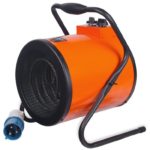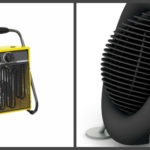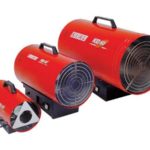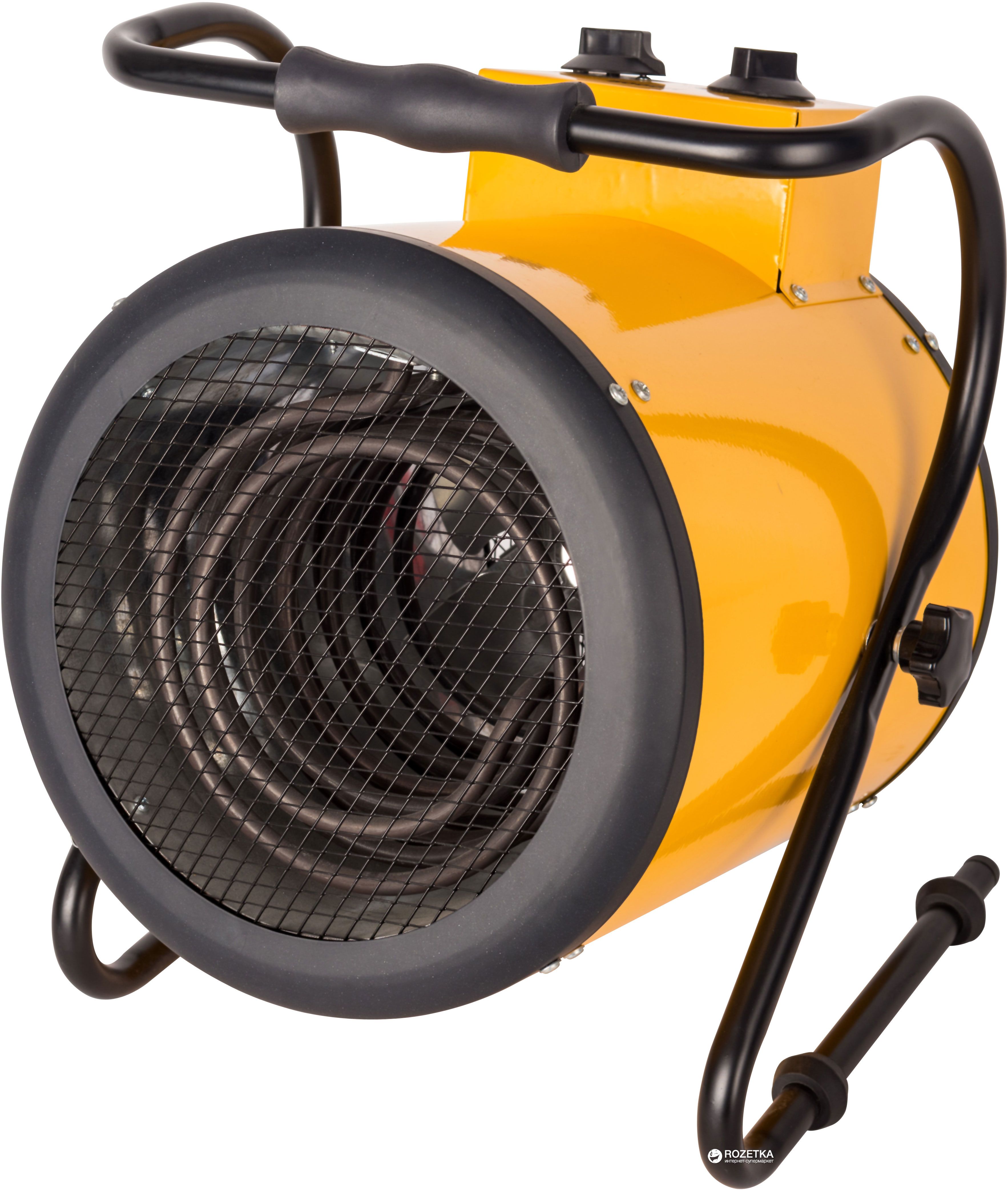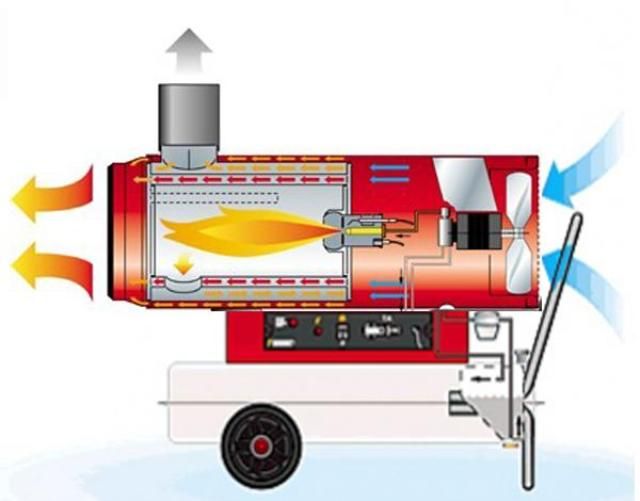How to choose a heat gun
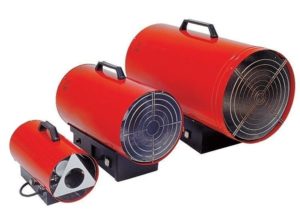 The leading position in the heating equipment market is occupied by heat guns, which are used to heat residential, industrial and warehouse premises, garages, greenhouses, offices, sales areas, country buildings, etc. An air heater with a built-in fan quickly pumps in warm air, which creates a comfortable microclimate even in severe frosts.
The leading position in the heating equipment market is occupied by heat guns, which are used to heat residential, industrial and warehouse premises, garages, greenhouses, offices, sales areas, country buildings, etc. An air heater with a built-in fan quickly pumps in warm air, which creates a comfortable microclimate even in severe frosts.
The content of the article
Types of heat guns
Manufacturers of heating devices produce several types of heat guns:
- Multi-fuel, including liquid fuel. The device is ideal for car services: the owner saves on heating the room by using drained motor oil. Such units operate for more than ten hours without a break.
- Gas heat guns. They are autonomous and stationary. Such equipment is widely used in the agricultural industry. The gas burner located inside the device promotes uniform heat distribution. A device running on natural gas consumes a small amount of electricity, which allows for significant savings.
- Electric heat guns are widely used both in everyday life and in production. Modern models are equipped with a spiral or tubular electric heater.The latter has a long service life. All such devices are equipped with an electric fan heater and thermostat that maintains a constant temperature and prevents overheating.
- Infrared heat guns. They do not have a fan. The radiated heat increases the temperature of surrounding objects. The air warms up due to heat transfer. Such devices are used during repair work to uniformly dry walls and ceilings.
- Diesel heat guns. They quickly heat the room and are used during construction work in winter. There are direct and indirect heating models. The power of diesel heat guns is greater than that of multi-fuel units.
IMPORTANT! Electric heat guns with a power exceeding five kilowatts should be connected to a three-phase power supply system.
Which heat gun to choose to solve a specific problem
A wide range of heating units makes it difficult to choose for a specific task. Which heating device models are best suited for an apartment, and which device is better to buy for a garage?
For heating a living space
 When choosing a heating device for a house or apartment, it is necessary to take into account the area of the room, the properties of the building materials from which the walls are built (wood, brick), as well as the presence of thermal insulation. The best option is an electric heat gun.
When choosing a heating device for a house or apartment, it is necessary to take into account the area of the room, the properties of the building materials from which the walls are built (wood, brick), as well as the presence of thermal insulation. The best option is an electric heat gun.
For living rooms, you should purchase indirect heating guns. In such devices, the burner flame is isolated and combustion products are removed through the exhaust system. Indirect heating guns are safe for humans and pets.
ATTENTION! In a private home, a heat gun is simply irreplaceable, because with it you can not only warm up, but also dry out basements and cellars and get rid of mold.
For heating a warehouse
It is irrational to use electrical appliances for heating hangars and warehouses due to high energy costs. When choosing a device, you should take into account the weather conditions of the region. For mild climates, gas guns are suitable; for climate zones with harsh winters, a direct heating device running on diesel would be an ideal option.
Greenhouse gun
 When creating greenhouse conditions for growing garden crops, summer residents give preference to gas heating units. Diesel or electric appliances are sometimes used. The main requirement for installing the device: the heat gun should be suspended from the roof of the greenhouse so that the pumped warm air does not burn the leaves of the plants.
When creating greenhouse conditions for growing garden crops, summer residents give preference to gas heating units. Diesel or electric appliances are sometimes used. The main requirement for installing the device: the heat gun should be suspended from the roof of the greenhouse so that the pumped warm air does not burn the leaves of the plants.
IMPORTANT! Thanks to the mesh heater, the rectangular guns do not dry out the air in the room.
General criteria for choosing the right heat gun
What parameters should you definitely pay attention to:
- Determination of power. It takes one hundred watts to heat 1 m². It turns out that for a room with an area of 100 m² you will need a heating device with a power of at least 10 kilowatts. For a more accurate calculation of power, the height of the ceilings and the number of windows and doors are taken into account.
- Presence of combustion products. Direct heating devices are suitable for open construction sites. They are installed for rooms with a good ventilation system.
- Autonomous heat guns work less than stationary ones. Stationary devices are characterized by high performance.Despite their impressive size, they are considered more economical than miniature heating devices.
- Safety. The device housing must be resistant to mechanical damage. Sensors that are triggered when the device overheats are designed to prevent damage and fire. To increase the level of safety, manufacturers produce models that automatically turn off in the event of a rollover.
- Quiet operation. A humming device operating for several hours in a row negatively affects a person’s well-being. The noise level produced must be within reasonable limits. Units that produce a noise level of less than 40 decibels during operation do not create additional stress on the hearing aid.
- No suspicious odors. Some heating devices, the design of which is dominated by plastic parts, emit an unpleasant chemical odor. Ceramic heaters are considered the safest.
- Easy installation and ease of use. For temporary heating of a house or apartment, it is better to choose models that do not require a chimney or ventilation system. They just need to be connected to the power supply system.
- Compactness. Rectangular and cylindrical heating units take up less space than models running on diesel or gas. Another advantage of electrical appliances is their mobility.

